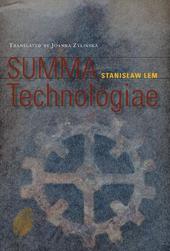
|
Summa Technologiae
Paperback / softback
Main Details
| Title |
Summa Technologiae
|
| Authors and Contributors |
By (author) Stanislaw Lem
|
|
Translated by Joanna Zylinska
|
| Series | Electronic Mediations |
|---|
| Physical Properties |
| Format:Paperback / softback | | Pages:440 | | Dimensions(mm): Height 229,Width 152 |
|
| Category/Genre | Literary theory
Impact of science and technology on society |
|---|
| ISBN/Barcode |
9780816675777
|
| Classifications | Dewey:306 |
|---|
| Audience | |
|---|
| Illustrations |
1
|
|
Publishing Details |
| Publisher |
University of Minnesota Press
|
| Imprint |
University of Minnesota Press
|
| Publication Date |
1 January 2014 |
| Publication Country |
United States
|
Description
The Polish writer Stanislaw Lem is best known to English-speaking readers as the author of the 1961 science fiction novel Solaris, adapted into a meditative film by Andrei Tarkovsky in 1972 and remade in 2002 by Steven Soderbergh. In Summa Technologiae - his major work of nonfiction, first published in 1964 and now available in English for the first time - Lem produced an engaging and caustically logical philosophical treatise about human and nonhuman life in its past, present, and future forms.
Author Biography
Stanislaw Lem (1921-2006) was the best-known science fiction author writing outside the English language. His books have been translated into more than forty languages and have sold more than 27 million copies worldwide. Joanna Zylinska is professor of new media and communications at Goldsmiths, University of London. She is the author of Bioethics in the Age of New Media and The Ethics of Cultural Studies.
Reviews"At the end of the thirteenth century, Thomas Aquinas wrote the Summa Theologiae, an ambitious compendium of all orthodox philosophical and theological knowledge about the world. Seven hundred years later, science fiction author Stanislaw Lem writes his Summa Technologiae, an equally ambitious but unorthodox investigation into the perplexities and enigmas of humanity and its relationship to an equally enigmatic world in which it finds itself embedded. In this work Lem shows us science fiction as a method of inquiry, one that renders the future as tenuous as the past, with a wavering, 'phantomatic' present always at hand." -Eugene Thacker, author of After Life "Summa is a fantasia that follows certain lines of speculative thought as far as Lem can take them. Lem's sober materialism may seem dehumanizing, but he brings back to the frontier a question that has plagued civilization since the beginning, and whose shifting, always insufficient answers have always signaled revolutions in culture: what is it to be human?" -Los Angeles Review of Books "With Summa Technologiae, his masterwork of non-fiction which has been translated into English for the first time, Lem has taken Western civilisation for a spin-with spectacular consequences. " -New Scientist
|